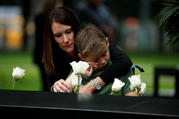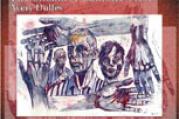Loading...
Click here if you don’t see subscription options
Click here if you don’t see subscription options

Politics & SocietyEditorials
Faced with the enormity of suffering and evil that we have seen in the terrorist attacks on the World Trade Center and the Pentagon, it is impossible to find words that are adequate to comprehend it. When we search for words to deal with this tragedy, we quickly find ourselves at a loss. In the face

Film
Forgive the ponderous title. As a veteran reviewer, I do recognize the limits of my role. Ordinarily, I would try to find a mildly entertaining way to remind readers that Francis Coppola’s Apocalypse Now received a warm if not enthusiastic welcome when it first appeared in 1979. I would conclu

Letters
Look to TeensAs I read “‘Home Alone’ in the Priesthood,” by Monsignor Eugene Gomulka (8/27), I was struck by a rather distressing thought: “They complain endlessly about the lack of new blood in the priesthood and its effects, but they never seem to propose anything to

News
Nation Moves from Terror to PrayerAmericans moved quickly from shock and terror to prayer after suicidal terrorists used hijacked passenger planes to demolish the twin towers of the World Trade Center and a large section of the Pentagon. On Sept. 16 worshippers packed St. Patrick’s Cathedral i
The WordTwenty-sixth Sunday in Ordinary Time (C), September 30, 2001
The Lord gives sight to the blind. The Lord raises up those who were bowed down. The Lord loves the just (Ps. 146:8)

Editorials
Shock, denial, anger and depression swept the country on Sept. 11 as the nation watched thousands of civilians and military people viciously murdered by terrorists. Not since Pearl Harbor has the United States suffered such a devastating attack on its soil, and the number of dead exceeds those kille

FaithFaith and Reason
I used to think it was arrogant of the church not explicitly to include symbols from popular media culture in liturgy.

News
Catholics Pray, Agencies Assist in Wake of Terrorist AttacksCatholic bishops and priests led prayers and church-run hospitals and agencies mobilized to assist the victims in the wake of the worst terrorist attack in U.S. history. Virtually every Catholic church in the United States scheduled a speci

The Declaration Dominus Iesus, issued in September 2000 by the Congregation for the Doctrine of the Faith, aroused deep concern among many Jews and not a few Catholics. Let me first survey the specific areas of concern, then proceed to address the question of whether or not Jews can plausibly be sai

In an age when the Taliban invoke religion to justify demolishing statues of Buddha, it is heartening to learn of a Catholic jurist who used all of his powers of argument to prevent the burning of Jewish books. Better still to learn that the legal text through which he accomplished this feat is now,

